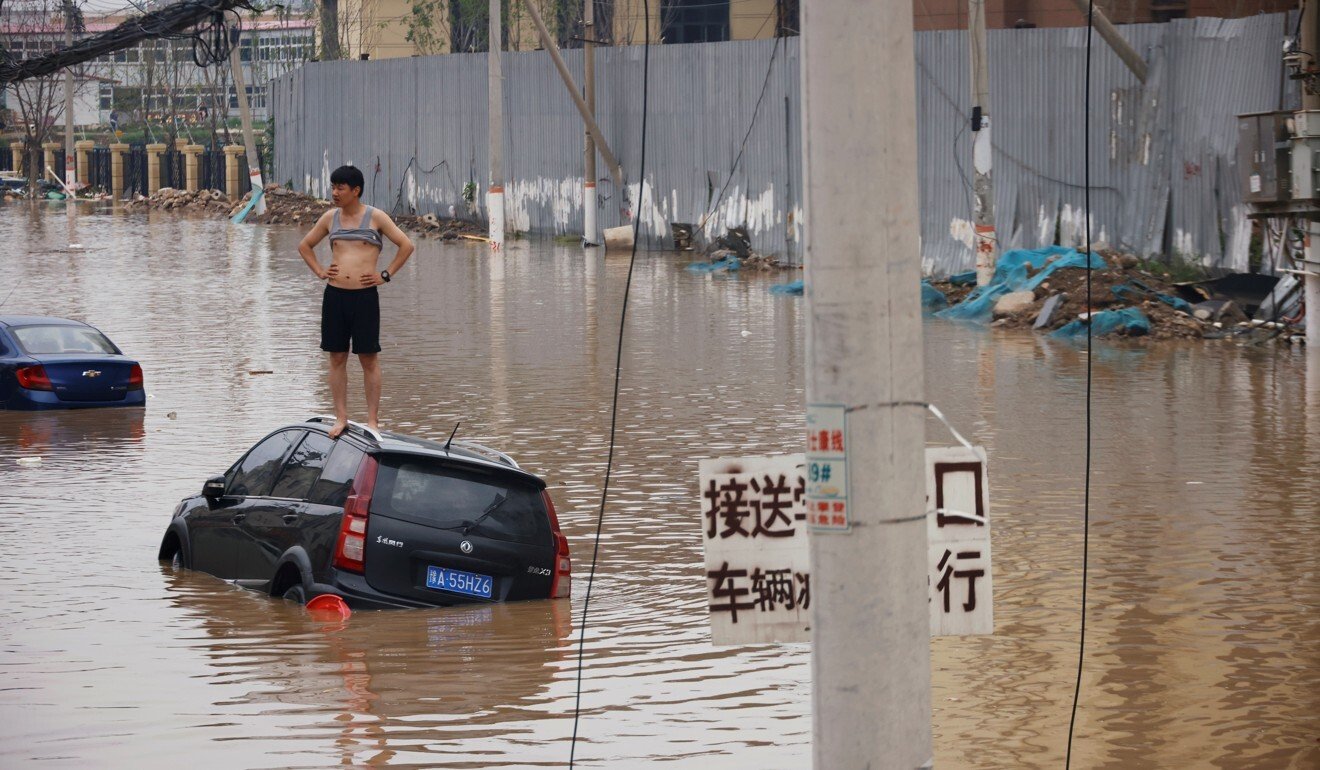
China floods: did Zhengzhou’s ‘smart’ flood prevention system fail to prevent the disaster?
- Two high-profile smart city projects in Zhengzhou, one for flood management and another for tunnel safety, have been singled out for criticism
- Analysts say other factors, such as local government coordination and the design capacity of systems, also need to be examined as part of investigation
Zhengzhou’s much-hyped smart city systems, which were supposed to help planners with urban management and safety, have come under heavy scrutiny after recent floods wreaked havoc with city infrastructure and caused dozens of deaths.
Two high-profile smart city projects in Zhengzhou, a city of 10 million people in central China, have been singled out for criticism after record rainstorms battered Henan province last week, causing at least 66 deaths, including 14 in the local subway system and six in the Jingguang Road Tunnel.
One of the technologies concerned is a real-time flood prevention system installed in the city last December by the Aerospace Shenzhou Smart System Technology Co, an affiliate of the state-owned China Aerospace Science and Technology Corporation for Zhengzhou.
According to official statements, the system is designed to help the municipal authority monitor water levels in real time through sensors and “intelligent analysis” and notify relevant departments of incoming dangers. It has access to databases from several local bureaus, including big data on meteorology, hydrology and other relevant fields.

04:02
Zhengzhou residents mourn subway flood victims in China’s central Henan province
The other technology is a monitoring system for the Jingguang Road Tunnel, installed as part of the city’s 2020 initiative to keep an eye on tunnel safety.
An official media report said in June that the cameras and sensors in the tunnel had made the infrastructure “smart” and could even send alerts via smartphone apps about accidents or impending danger. Despite this, it appears that during last week’s floods drivers were not aware of the looming disaster.
However, it is not yet known whether the two systems failed to issue warnings or whether relevant Zhengzhou government agencies failed to take action upon receiving system alerts.
‘Digital dark age’ after disaster wreaks havoc on internet and electricity
The Zhengzhou municipal authority told the South China Morning Post that an investigation of why smart city systems failed to protect citizens will take place once emergency flood drainage and rescue work is complete.
Aerospace Shenzhou Smart System, the developer of the flood monitoring system, did not respond to calls and faxed requests for comment. Zhengzhou Tunnel Centre, which is in charge of running the tunnel, did not respond to a request for comment.
Questions about the smart city systems have appeared on Chinese social media. Ge Wenyao, a partner of a Shanghai private equity fund, commented on Weibo on Monday that the Zhengzhou smart city projects were “a waste of money and are completely useless”. His criticism received support and likes from many users of Weibo, China’s Twitter-like social media platform.

Other analysts question the role of local government bureaucracies in the disaster. Lack of efficiency or coordination among different agencies may have failed to turn system signals into timely public warnings.
For example, the Zhengzhou municipal meteorological service sent five “red alerts” about heavy rain, the highest level of weather warning, but the municipal authority of Zhengzhou did not take action to suspend schools or traffic.
Patrick Zhan, research manager at IT consulting firm IDC, said that the issuance of catastrophic preventive information often needs coordination between different departments. “Whether recipients take the warning seriously is out of the control of the senders,” he said.
Much of Shanghai shuts down as Typhoon In-fa lashes city
Zhan added that many smart city projects in China are far from being ready to deal with natural disasters and most Chinese cities are still in the preliminary stages of “laying the foundations” for smart cities by installing cameras, clouds, data centres and processing platforms.
Other analysts said last week’s rainfall was so extreme it may have exceeded the system’s designed capacity. Around 25 inches of rain fell in the 24 hours ending July 20, with the local government saying this had not been seen “for a thousand years”.
Carman Lee, an associate professor at the Hong Kong Polytechnic University, said that flood monitoring systems such as the one used in Zhengzhou, apply similar technologies to monitoring systems in Hong Kong, and extreme weather may overwhelm the system.

01:14
Chinese mechanic rescues 71 stranded passengers from flood-stricken buses in Henan province
Smart cities have become a buzzword in recent years in China as local governments aspire to use new technology to digitalise city management and improve the living standards of city dwellers. The umbrella term has been used to cover everything from surveillance to urban infrastructure, city services, transportation and energy management.
China’s tech giants including Alibaba Group Holding, Tencent Holdings, Baidu, and Huawei Technologies Co have all scrambled to grab market share, offering services ranging from clouds to digital infrastructure such as data centres and full-stack computing solutions. Alibaba owns the South China Morning Post.
By the end of 2019, more than 500 cities in China had embarked on different types of smart city projects, but only 8.4 per cent of smart cities had reached mature levels, with more than 43 per cent remaining in the preliminary stages, according to a report from the National Development and Reform Commission, the country’s economic planner.
People still searching for missing relatives after China floods
Qian-ming Lu, managing director of DHI China, a water environment solutions provider, said that some local governments have opted for smart city projects that are just “for show” instead of targeting real-life problems. Lu said urban flooding monitoring, prevention and management should be “one of the most important issues when looking at smart city construction”.
This gap between vision and reality is an issue for many government-led projects in China, said one expert, although big data management is making a difference.
“The smart city is more of a concept in urban design projects than a reality in China. But the collection, treatment and consolidation of big data is leading to new urban experiences in the country’s largest cities,” said Pan Anyi, a French urban-planning expert who worked for more than a decade in China.


